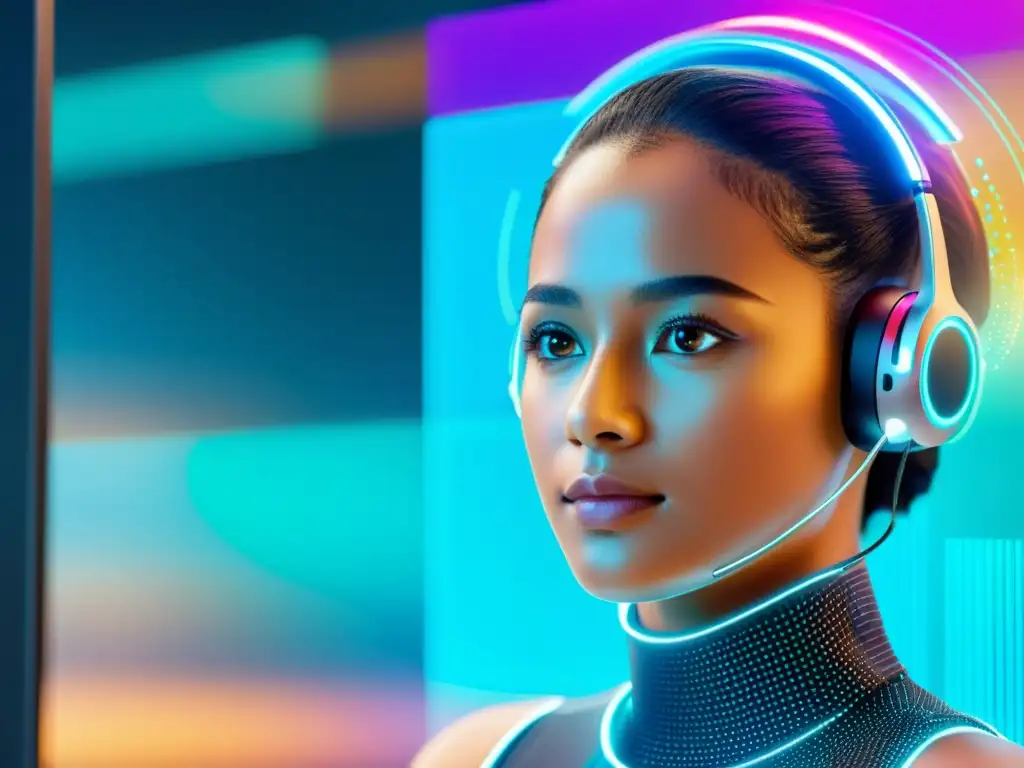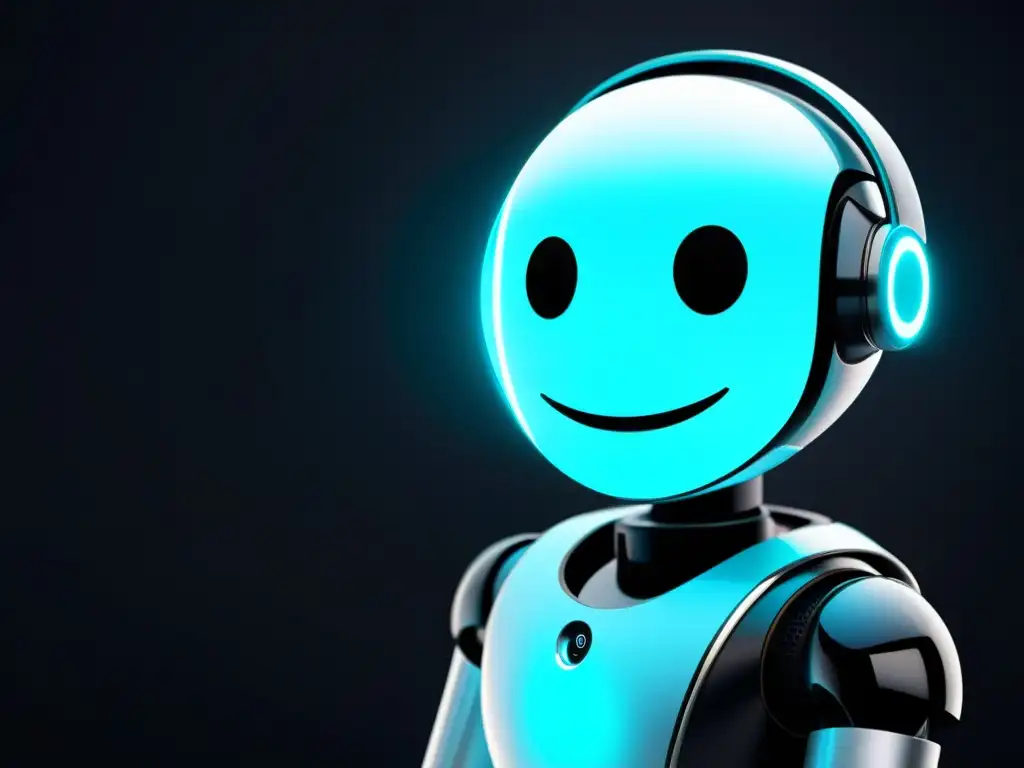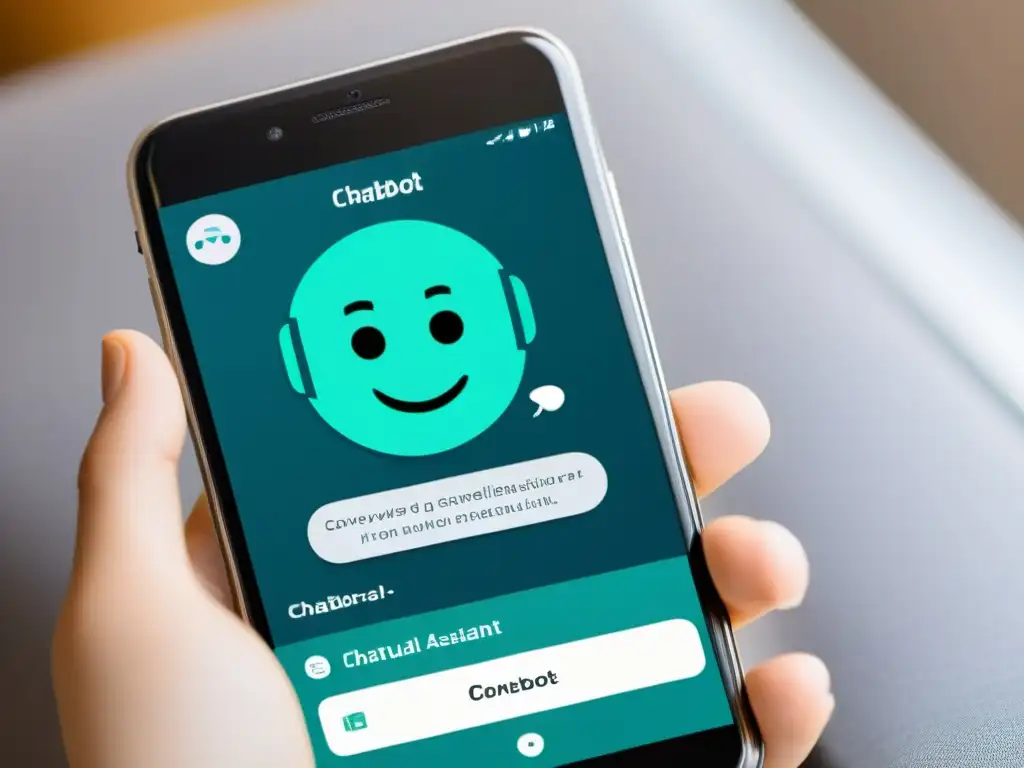Smart Chatbots: The End of Long Waits in Customer Service?
Introduction

The impact of artificial intelligence on customer service
Artificial intelligence (AI) has revolutionized the way businesses interact with their customers. In the field of customer service, AI has enabled the implementation of automated systems that can efficiently understand and respond to user queries. This technological evolution has led to the creation of intelligent chatbots, which play a crucial role in optimizing the customer experience.
Intelligent chatbots use machine learning algorithms to understand natural language and provide accurate responses to user queries. This ability to quickly and accurately interpret customer needs has completely transformed the dynamics of customer service, significantly reducing wait times and improving customer satisfaction.
The implementation of AI in customer service has not only streamlined processes but has also allowed companies to gather valuable data on customer preferences and behaviors, which in turn has contributed to personalized services and the development of more effective customer loyalty strategies.
The evolution of intelligent chatbots
Intelligent chatbots have undergone a remarkable evolution since their introduction to customer service. Initially, chatbots offered predefined responses and were limited in their ability to understand natural language and resolve complex queries. However, with advances in AI, today's intelligent chatbots are capable of maintaining fluid and contextual conversations with customers, providing solutions tailored to each user's individual needs.
The integration of technologies such as natural language processing (NLP) and natural language processing (NLU) has enhanced chatbots' ability to understand the intent behind customer queries, allowing them to deliver relevant and accurate responses in real time. This evolution has positioned intelligent chatbots as a fundamental tool in optimizing customer service, providing immediate and accurate responses 24/7.
Furthermore, intelligent chatbots have also incorporated continuous learning capabilities, allowing them to improve their performance as they interact with users. This ability to constantly adapt and improve has contributed to the effectiveness and relevance of intelligent chatbots in resolving queries and providing personalized services.
Importance of chatbots today
Today, intelligent chatbots have gained significant importance in the field of customer service, becoming a fundamental tool for companies seeking to offer efficient and personalized service. Chatbots' ability to handle multiple inquiries simultaneously, without waiting times, has optimized the operational efficiency of customer service departments, freeing up human agents to handle more complex and specialized inquiries.
Furthermore, intelligent chatbots have proven to be a strategic investment for businesses, reducing operational costs associated with customer service and response times, which translates into a significant improvement in customer satisfaction. Chatbots' ability to provide quick and accurate responses, combined with their 24/7 availability, has had a positive impact on brand perception and customer loyalty.
Intelligent chatbots have redefined the way businesses approach customer service, offering efficient, personalized, and always-on solutions, making them an indispensable tool in today's business landscape.
Intelligent chatbots in customer service

What are intelligent chatbots?
Intelligent chatbots are artificial intelligence programs designed to simulate conversations with users through messaging apps, websites, or social media. These systems use natural language processing (NLP) algorithms to interpret user queries and generate coherent and useful responses in real time.
Intelligent chatbots are trained to understand human language, allowing them to offer an interaction closer to the experience of conversing with a human. They use machine learning techniques to improve their understanding and response capabilities as they interact with more users.
These chatbots are a powerful tool for businesses, allowing them to automate customer service processes, provide quick responses to common inquiries, and free up human agents to handle more complex or personalized cases.
Benefits of intelligent chatbots in customer service
Implementing intelligent chatbots in customer service offers a number of significant benefits for both businesses and users.
- 24/7 Availability: Chatbots can handle queries at any time of day, allowing businesses to offer continuous customer service regardless of the user's time zone.
- Instant Answers: Chatbots can provide immediate responses to common queries, eliminating the need to wait in line to be served by a human agent.
- Cost reduction: By automating part of customer service, companies can reduce the need for a large team of agents, leading to significant savings in operating costs.
- Personalization and Contextualization: Chatbots can personalize responses based on the user's interaction history, offering a more relevant and personalized experience.
How chatbots work in customer service
Intelligent chatbots use natural language processing algorithms to analyze and understand user queries. Using machine learning models, these systems are able to identify patterns in language and generate coherent and relevant responses.
Additionally, chatbots can be integrated with knowledge bases and customer management systems, allowing them to access up-to-date and relevant information to provide accurate and helpful responses to users.
In customer service, chatbots can be implemented on messaging platforms, websites, and mobile apps, giving users the ability to receive quick and efficient assistance on the channel of their choice.
Successful implementation of intelligent chatbots
The successful implementation of intelligent chatbots in customer service can offer numerous benefits for both businesses and users. These chatbots, powered by artificial intelligence, are able to understand and respond to customer queries quickly and efficiently, which can significantly reduce wait times. Furthermore, by utilizing machine learning algorithms, chatbots can continuously improve their ability to resolve complex queries and provide more accurate responses over time.
By integrating intelligent chatbots into messaging platforms, websites, and mobile apps, businesses can offer 24/7 customer service, resulting in increased customer satisfaction and reduced operating costs. Chatbots' ability to handle multiple inquiries simultaneously also contributes to greater customer service efficiency, which can lead to higher customer retention and improved brand reputation.
Furthermore, the successful implementation of intelligent chatbots can provide businesses with valuable data on customer inquiries and needs. By analyzing user interactions with chatbots, companies can gain detailed insights into customer service trends, preferences, and areas for improvement, allowing them to make informed decisions to optimize their customer service and marketing strategies.
Challenges and limitations

Challenges of intelligent chatbots in customer service
Intelligent chatbots represent a revolution in customer service, but they also face significant challenges. One of the main challenges is the ability to understand and respond effectively to user queries and issues. Customers may often ask vague questions or use informal language, making it difficult for the chatbot to provide accurate answers. Furthermore, the need to maintain coherent and contextual conversations represents an additional challenge for chatbots, as they must be able to remember previous interactions and adapt to the current conversation.
Another important challenge is chatbots' ability to handle complex or emotional situations. In some cases, customers may be experiencing frustration or anger, which requires an empathetic and understanding response. Intelligent chatbots must be able to detect these emotions and respond appropriately, which represents a significant challenge in the development of this technology.
Furthermore, security and privacy are important concerns in customer service, and chatbots must be able to securely handle sensitive information and comply with data protection regulations. Ensuring the integrity and security of customer interactions is critical to gaining their trust and promoting the adoption of this technology.
Current limitations of intelligent chatbots
While intelligent chatbots have advanced significantly in recent years, they still have limitations in their capabilities. For example, natural language understanding and the ability to maintain contextual conversations are still areas where chatbots can fall short. Users are often faced with inaccurate or irrelevant responses due to chatbots' difficulty interpreting the full meaning of a query.
Another important limitation is chatbots' ability to solve complex problems or unusual situations. While they can effectively handle simple queries, chatbots often lack the ability to address problems that require more complex reasoning or specialized knowledge. This can be frustrating for users seeking assistance on more advanced or specific topics.
Finally, the lack of personalization and empathy is another key limitation of intelligent chatbots. Despite advances in response personalization, chatbots still lack the ability to empathize with customers' emotions and experiences in the same way a human agent would. This lack of empathy can affect the quality of the interaction and customer satisfaction.
Impact on customer experience

Personalization and efficiency in customer service
Intelligent chatbots are revolutionizing customer service by providing a highly personalized and efficient experience. Through data analysis and machine learning, these systems can understand individual customer needs and offer responses and solutions tailored to each specific situation. This personalization capability not only improves customer satisfaction but also streamlines the customer service process, drastically reducing wait times.
Additionally, intelligent chatbots have the ability to instantly access customer information, such as purchase history or preferences, allowing them to offer recommendations and personalized assistance quickly and accurately. This combination of personalization and efficiency is transforming the way companies interact with their customers, generating a significant impact on customer retention and loyalty.
Implementing intelligent chatbots in customer service not only boosts operational efficiency but also elevates the quality of the customer experience, setting a new standard in service delivery.
Human interaction vs. chatbot interaction
Traditional human interaction in customer service has been replaced in many cases by interaction with intelligent chatbots. While some might see this as a loss of human connection, the reality is that chatbots are designed to provide quick and accurate responses, freeing up human representatives to handle more complex cases that require a more individualized approach.
Furthermore, intelligent chatbots are being designed to effectively simulate human conversation, using natural language and contextual understanding to provide an experience as close as possible to an interaction with a human agent. This ability to intelligently understand and respond to customer queries has led to increasing acceptance of chatbots as a viable and effective alternative to human interaction in customer service.
While human interaction will continue to play a crucial role in situations requiring empathy and emotional understanding, intelligent chatbots are proving to be an invaluable tool for resolving queries and issues quickly and efficiently.
Continuous improvement: adaptation to customer needs
One of the most notable advantages of intelligent chatbots in customer service is their ability to continuously learn and improve. As they interact with customers and collect data, these systems can identify patterns, trends, and areas for improvement in their responses and functionality.
This adaptability allows intelligent chatbots to constantly evolve to meet changing customer needs and expectations. By analyzing feedback and interaction data, chatbots can adjust their responses, offer new features, and improve their ability to resolve queries more effectively.
In a constantly evolving business environment, the ability to adapt and continuously improve is essential, and intelligent chatbots are proving to be an invaluable tool for staying aligned with market demands and customer expectations.
The future of intelligent chatbots

Innovations in the development of intelligent chatbots
Intelligent chatbots, also known as virtual assistants, have experienced significant advancements in recent years. Innovations in the development of this technology have enabled chatbots to understand and process natural language more effectively. Thanks to the use of machine learning and natural language processing (NLP) algorithms, chatbots can interpret user queries more accurately and offer more relevant and helpful responses.
Furthermore, the integration of technologies such as voice recognition and contextualization capabilities has improved chatbots' ability to maintain more fluid and personalized conversations. These advances in the development of intelligent chatbots have revolutionized the way companies interact with their customers, offering faster, more efficient, and personalized service.
The evolution of intelligent chatbots has also included the ability to learn and adapt through interaction with users, allowing them to continually improve their performance and offer more accurate responses as they gain experience.
Integration of chatbots in different sectors
The versatility of intelligent chatbots has led to their integration into a wide variety of sectors, from retail to banking, healthcare, education, and more. In the customer service sector, chatbots have proven to be an invaluable tool for providing immediate assistance to users, resolving common queries, and streamlining customer service processes.
In banking, intelligent chatbots are used to help customers make transfers, check balances, and obtain information about financial products. In the healthcare sector, chatbots can provide symptom guidance, schedule appointments, and offer medication reminders. The integration of chatbots in various sectors has proven to improve operational efficiency, increase customer satisfaction, and free employees from repetitive and administrative tasks.
Furthermore, in the retail sector, intelligent chatbots are used to provide personalized product recommendations, process orders, and offer purchasing advice. This integration has allowed companies to improve their customers' shopping experience, increase retention, and ultimately boost sales.
Possible future scenarios in customer service
The future of customer service looks increasingly automated and personalized, thanks to advances in intelligent chatbot technology. These virtual assistants are expected to be able to handle an even wider range of queries and requests, thanks to their ability to understand the context and emotions behind human interactions.
Furthermore, intelligent chatbots are expected to be able to anticipate customer needs, offering proactive and personalized solutions rather than simply reacting to queries. This predictive capability will allow companies to meet customer needs more efficiently and effectively, generating more satisfying experiences and building user loyalty.
Intelligent chatbots promise to revolutionize customer service, offering fast, accurate, and personalized responses, freeing up customer service professionals to focus on more complex and strategic tasks. With their ability to learn and adapt, these virtual assistants are paving the way for a future where customer service is more efficient and satisfying than ever.
Conclusions

The fundamental role of intelligent chatbots in customer service
Intelligent chatbots have revolutionized the way businesses interact with their customers. These artificial intelligence systems are capable of understanding and processing natural language, allowing them to answer questions, solve problems, and offer 24/7 support. Their ability to handle multiple inquiries simultaneously makes them an invaluable tool for customer service.
Furthermore, intelligent chatbots can be integrated into various messaging platforms, mobile apps, and websites, making them accessible to customers anytime, anywhere. This continuous availability and the ability to provide quick and accurate responses significantly improve the customer experience.
Intelligent chatbots play a pivotal role in providing efficient, accessible, and personalized customer service, benefiting both businesses and end-users.
Balance between technology and quality in customer service
When implementing intelligent chatbots in customer service, it's crucial to strike a balance between technology and service quality. While chatbots can effectively resolve many queries, it's important to recognize that there are situations that require human intervention. Therefore, companies must ensure that chatbots are backed up by human support capable of intervening when necessary.
Furthermore, ongoing chatbot training and development are critical to ensuring accurate and relevant responses. Integrating machine learning and natural language processing systems allows intelligent chatbots to improve their performance over time, helping to maintain a high level of customer service quality.
Ultimately, the successful implementation of intelligent chatbots in customer service depends on finding the right balance between technological efficiency and customer service quality.
The end of long waits in customer service?
While intelligent chatbots have significantly reduced wait times in customer service, they don't necessarily represent the end of long waits. There are cases where human intervention is still necessary, and in those cases, the wait can be prolonged.
However, it's undeniable that intelligent chatbots have significantly contributed to reducing long wait times in customer service. Their ability to provide immediate responses and efficiently resolve queries has significantly improved the customer experience, leading to an overall decrease in wait times.
While intelligent chatbots don't represent the ultimate end to long waits in customer service, they have significantly reduced wait times and improved the efficiency of customer service delivery.
Frequently Asked Questions
1. What are intelligent chatbots?
Intelligent chatbots are computer programs that use artificial intelligence to simulate human conversations in order to interact with users or customers.
2. How can chatbots benefit customer service?
Chatbots can benefit customer service by providing quick and accurate responses to inquiries, reducing long wait times and improving the customer experience.
3. What are the advantages of using intelligent chatbots in customer service?
Advantages include 24/7 availability, the ability to handle multiple queries simultaneously, and reduced operating costs by automating repetitive tasks.
4. What challenges can arise when implementing intelligent chatbots in customer service?
Some challenges include the need to ensure accurate responses and the ability to handle complex situations that require empathy or emotional understanding.
5. How can information security be guaranteed when using intelligent chatbots?
Information security can be ensured through the use of encryption measures, secure authentication, and compliance with data privacy regulations.
Final Thoughts: The Impact of Smart Chatbots on Customer Service
Today, the implementation of intelligent chatbots in customer service is more relevant than ever, as companies seek to optimize the user experience and streamline problem resolution.
The influence of intelligent chatbots on the way we interact with companies is undeniable. "Technology is neither good nor bad, nor neutral," as historian Melvin Kranzberg asserted, and in the case of chatbots, their impact depends on how companies and users utilize them. "Technology is just a tool. In terms of getting children to work together and motivating them, the teacher is the most important person" - Bill Gates.
I invite each reader to reflect on how intelligent chatbots can improve or transform their own consumer experience. Let's take this opportunity to consider how technology can be an ally in improving customer service, and how we can contribute to its development and responsible use.

Publicar un comentario